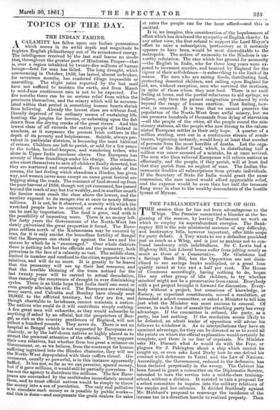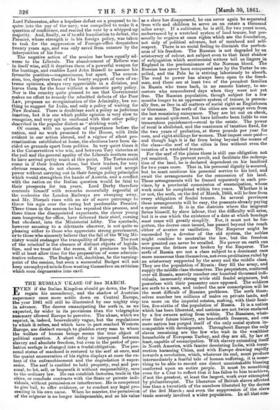THE PARLIAMENTARY TRUCE OF GOD. T HE session thus far has
not been advantageous to the Whigs. The Premier committed a blunder at the be- ginning of the session, by leaving Parliament no work on which to employ its superabundant energies. The Bank- ruptcy Bill is the sole ministerial measure of any difficulty, and bankruptcy bills, however important, offer little scope for party debate. A Tory wants to see a defaulter punished just as much as a Whig, and is just as anxious not to con- found insolvency with indebtedness. Sir C. Lewis had a Highway Bill, but Liberal bones suffer from jolting nearly as much as those of a Conservative. Mr. Gladstone had a Savings Bank Bill, but the Opposition are not disin- clined to see savings banks multiplied, or a great loan quietly raised at two and a half per cent. The House of Commons accordingly, having nothing to do, began like any other group of idle children, to try whether mischief might not be a preservative from ennui. Everybody with a pet project brought it forward for discussion. Every- body without a project, but conscious of knowledge, or fluency, or expectant constituents, moved a resolution, or demanded a select committee, or asked a Minister to tell him just what the Minister was most anxious to conceal. Of course, in such a line of assault the attacking party has every advantage. If the committee is refused, the party, as a party, has lost nothing. If the resolution seems likely to be defeated, an adroit leader of opposition will advise his follower to withdraw it. As to interpellations they have an unmixed advantage, for they can be directed so as to avoid all the points on which the official explanation would certainly be complete, and there is no fear of reprisals. No Minister asks Mr. Disraeli what he would do with the Pope, or plagues Sir J. Pakington about a ship which cannot be caught up, or even asks Lord Derby how he can defend his conduct with deference to Vattel and the Law of Nations. Accordingly, the Government, reduced to the defensive, has been declared perpetually in the wrong. The Cabinet has been forced to grant a committee on the Diplomatic Service, intended to turn the service into a middle-class training- school, without a division. It resisted in vain a proposal for a select committee to inquire into the military relations of the empire and her colonies. It divided fruitlessly against Mr. Hubbard's proposal to rearrange the incidence of the income tax in a direction hostile to realized property. Then Lord Palmerston, after a hopeless defeat on a proposal to in- quire into the pay of the navy, was compelled to make it a question of confidence, and rescind the vote by a whipped-up majority. And, finally, as if to add humiliation to defeat, the Premier, whose strength is in his foreign policy, was taken to task for the suppression. of Foreign-office despatches twenty years ago, and was only saved from censure by the interposition of his foes.
The negative action of the session has been equally ad- verse to the Liberals. The abandonment of Reform was . . in itself wise, still it deprives them of a powerful weapon for the hustings, and enables Lord John Russell to assume his favourite position—magnanimous, but apart. The conces- Bien, too, deprives them of the hearty support of men of ex- treme opinion, always very appreciable in a division, and leaves them for the hour without a domestic party policy. Nor is the country quite pleased to see that Government makes no effort to remedy the admitted defects of the Poor Law, proposes no reorganization of the Admiralty, has no- thing to suggest for India, and only a policy of waiting for New Zealand. There is doubtless such apolicy as judicious inactiou, but it is one which public opinion is very slow to recognize, and very apt to confound with that other policy described in the popular dialect as "shirking work." Of course, with no question of importance before the nation, and no work promised to the House, with little evident in our action abroad, and a regime of silent pro- crastination established at home, the elections have been de- .cifled on grounds apart from politics. In very quiet times it is the Conservatives who win, and between Tory victories at the poll and the general apathy of the Liberals matters seem to have arrived pretty much at this point. The Tories could come in if their leaders chose, but their leaders, for very obvious reasons, do not choose. They could not accept power without carrying out in their foreign policy principles which would strengthen the hands of Austria, and a conflict with the nation on the Italian question would be fatal to their prospects for ten years. Lord Derby therefore contents himself with remarks mournfully regretful of the rookeries the London Railways are sweeping away, and Mr. Disraeli rises with an air of suave patronage to throw his tegis over the erring but pardonable Premier. Three times in the session he has repeated this process, and three times the disappointed expectants, the clever young men hungering for office, have followed their chief, cursing but obedient, into the Ministerial lobby. The spectacle, however amusing to a dilettante observer, is not quite so pleasing either to those who appreciate strong government, or to those who sincerely believe that the fall of the Whig Mi- nistry would endanger the tranquillity of Europe. The root of the mischief is the absence of distinct objects of legisla- tion, and we trust that the recess, if it produces no bills, will at least allow time for the preparation of some adminis- trative reforms. The Budget will, doubtless, be the turning- point of the session, but even a successful Budget will not keep unemployed minds from wasting themselves on criticism which soon degenerates into cavil.































 Previous page
Previous page